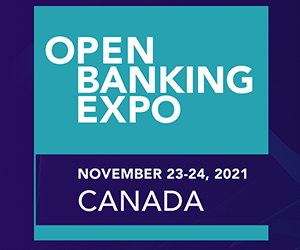London (UK), Toronto (Canada), September 27, 2021 – Open Banking Expo, the global community of open banking and open finance executives responsible for digital transformation across financial services, will return to Canada for a third year this November.
This two-day virtual event will bring together financial services and fintech innovators, visionaries, and disruptors who have been trailblazing consumer-directed finance since the event launched in 2019.

Adam Cox, co-founder of Open Banking Expo, said: “We are thrilled to be able to bring together the industry, especially at such an opportune time as the Canadian Government’s Advisory Committee published its Final Report on open banking setting out the road map and timeframes for its implementation. While still at the beginning of the journey, Canada boasts a growing community of open banking and open finance pioneers working to bring consumer-directed finance alive for consumers, small businesses, and the wider financial services sector. And we are proud to play our part in supporting this movement, which the line-up and agenda for this year’s event aptly reflect.”
The program is now live at www.openbankingexpo.com/canada.
Hundreds of C-level and senior-level delegates from across the financial services sector are expected to attend and exchange ideas and insights on the future open banking roadmap and what a “made-in-Canada” approach to its implementation will look like.
Headlined with an open keynote from Bill Morneau, Senior Fellow at Jackson Institute and former Finance Minister of Canada, the event will strike a healthy balance between debates, keynotes with industry overview, analysis and opinion on topics ranging from the role of open banking in the post-COVID-19 recovery and the security and privacy debate around data, to commercial opportunities for small businesses and what open banking means for Canadian consumers.
Some of the speakers include:
- Bill Morneau, Senior Fellow at Jackson Institute, and former Finance Minister of Canada
- Scott Farrell, Co-Chair, Australian Government & #39’s FinTech Advisory Group and led the Australian Government’s review into Open Banking in Australia
- Senator Colin Deacon, Advocate of consumer-directed finance, Senate of Canada
- Sumee Seetharaman, AVP Open Banking, TD Bank
- Stéphane Bousquet, Open Banking Leader, National Canada Bank
- Mark Paulsen, Senior Director – Strategic Platforms- API & Open Banking, CIBC
- Rami Thabet, VP, Digital Product, Royal Bank of Canada
- Chantal Bernier, former interim Privacy Commissioner of Canada, Counsel, Canadian Privacy and Cyber security Practice Group Lead, Dentons
- Jennifer Reynolds, Chief Executive Officer, Toronto Finance International
- Kevin Morris, Strategy and Programs Director, Large Credit Union Coalition
- Chantal Bernier, former interim Privacy Commissioner of Canada, Counsel, Canadian Privacy and Cyber Security Practice Group Lead, Dentons
- Elizabeth Sale, Partner, Banking & Financial Services, Osler, Hoskin & Harcourt LLP
- Bill Johnston, Senior Vice President & Chief Product Officer, Equifax Canada
- Matt MacNeil, Director, Standards & Technology, CIO Strategy Council
- Michelle Beyo, Chief Executive Officer, Finavator and Open Banking Initiative Canada Board Member
- Mayank Mishra, MD, Global Head of Digital Channels, Citi
- Hanna Zaidi, Director, Regulatory R&D, Wealthsimple
- Elena Litani, Senior Product & Technology Executive
- Julien Cousineau, Chief Technology Officer, Flinks
- Don Cardinal, Managing Director, Financial Data Exchange
While some say open banking in Canada has had a very slow start compared to other regions, it has recently had a big shot in the arm following the release of the Final Report by the Canadian Government’s Advisory Committee on open banking, which recommended the open banking framework be defined and implemented by January 2023.
The open banking initiative will enable consumers to give their consent to the secure sharing of data with service providers such as banks, credit unions, wealth management firms, and fintechs.
Credit: Source link


Comments are closed.